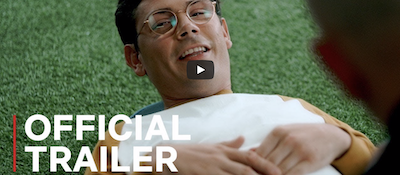More Than One-Third of LGBTQ+ Adults Have a Disability: Netflix’s Special Paves the Way for a More Inclusive Future
By Lauren Appelbaum, RespectAbility VP of Communications
Los Angeles, California, April 12 – Today’s release of Netflix’s new series Special is earning widespread praise for its authentic depiction of gay disabled life. People who are LGBTQ+ and people with disabilities has been severely underrepresented in the media and the fact that the show’s creator, Ryan O’Connell, is a gay man with cerebral palsy is a reason to celebrate.
“Shows like Special are, pardon the pun, special. But they shouldn’t be. It shouldn’t be so unusual to see someone with a disability who is also gay on screen, because there are plenty of people with disabilities in the LGBTQ+ community,” said Eric Ascher, RespectAbility’s Communications Associate who is both openly gay and on the autism spectrum.
More Than One-Third of LGBTQ+ Adults Have a DisabilityAmong lesbian, gay and bisexual adults, 30 percent of men and 36 percent of women also identify as having a disability. Ryan O’Connell joins the ranks of other celebrities and business leaders who are using their voice to share their stories, educating people about both visible and invisible disabilities. Notable examples include CNN anchor Anderson Cooper who is dyslexic, actor Josh Feldman who is deaf, comedian Stephen Fry who has bipolar disorder, artist Frida Kahlo who had polio and spinal and pelvis damage, Eddie Ndopu who has Spinal Muscular Atrophy, YouTuber Tyler Oakley who has depression, model Aaron Philip who is a wheelchair user with cerebral palsy, writer Leah Piepzna-Samarasinha who is chronically ill and journalist Melissa Yingst who is deaf.
Both people who identify as LGBTQ+ and people who have invisible disabilities such as learning disabilities like dyslexia, mental health or ADHD have to decide whether or not to “come out of the closet.” This is not an easy decision for most people because of the uncertainty of whether or not acceptance will follow.
While coming out as gay as a teenager was easy for O’Connell, he hid his disability in his early twenties, pretending his limp was caused by a car accident. In 2015 he wrote the truth in his memoir “I’m Special: And Other Lies We Tell Ourselves,” which led to the creation of this Netflix series.
“I wasn’t recognizing the psychic harm of being closeted,” he said during an interview with TIME. “Internalized ableism is a gnarly drug.”
Lack of Representation of LGBTQ+ Characters with Disabilities on TV
GLAAD’s 2018-2019 Where We Are on TV Report includes the only analysis of primetime scripted series regulars on broadcast networks of characters with disabilities. Largely known for tracking the number of LGBTQ+ characters on broadcast and cable networks, as well as streaming services, the Where We Are on TV Report also tracks racial, gender and disability inclusion on television.
The amount of regular primetime broadcast characters counted who have a disability has slightly increased to 2.1 percent, but that number still vastly underrepresents the actualities of Americans with disabilities. According to the Centers for Disease Control and Prevention, 1-in-4 American adults has a disability.
While the 2018-19 season includes 18 characters with disabilities, versus 16 in 2017-18, that number still vastly underrepresents the actual number of people with disabilities, representing less than one-sixth. Furthermore, while more than one-third of LGBTQ+ adults have a disability, GLAAD’s report found only four LGBTQ+ characters with disabilities.
“When you don’t see yourself being reflected back at you, you’re implicitly told that you don’t matter,” O’Connell said in an interview with Vulture. “That your life does not matter, it’s not worth being told, it’s not worth being discussed.”
In addition to writing, O’Connell stars in the show, even though he had not intended to. He had no money to hire an actor. O’Connell’s acting role is significant as actors without disabilities play more than 95 percent of all characters with disabilities on television.
Exploring New Topics, Creating Content People Want to See
One episode features a sex scene with Ryan and a sex worker he hired so he can lose his virginity. This scene in particular is making headlines, being covered in USA Today and The Daily Beast, among other publications.
“I am so frustrated by the lack of representation of gay sex in TV and film, like in Call Me by Your Name when they panned away to the moon,” O’Connell said in an interview with Vulture. “I want to bring gay sex to the forefront in a very accurate, human way… I wanted it to feel real. In season two, ideally, I wanna show a lot more gay sex. It will all have to serve the story, but I wanna normalize gay sex, and I wanna show different flavors of gay sex other than Queer As Folk porny whatever.”
Daily Beast entertainment reporter Kevin Fallon wrote, “It shows the mechanics, the discomfort, and mutual respect involved in two men having sex—something that is never shown on screen and certainly not in a TV show that’s meant to be heartwarming and, like we said before, important. Special proves you can do all of that.”
Changing Attitudes, Reducing Stigmas for People with Disabilities
“I feel like there’s such ignorance around disability, so people infantilize you,” O’Connell told the New York Post. “Hopefully with Special, people will start to see disabled people as strong, multifaceted human beings. We all are.”
Representation on screen can have a major effect on attitudes toward people with disabilities and LGBTQ+ people in society and shows like Special are paving the way for a better, more inclusive future.
|
